Dimapur/Chümoukedima: Four women, smartly dressed in grey polo-neck T-shirts, black trousers, and shiny block-heel shoes, focus intently on the plastic tables before them in a plain room in Nagaland. This is the most important part of their career training — the art of table setting with finesse. Plates come first, followed by spoons and forks, the distances precisely measured with their fingers. The knife is turned facing the side of the plate. The salt and pepper shakers are strategically placed. Finally, two stem glasses complete the meticulous arrangement.
There is a bit of Nagaland talent in every hotel, restaurant, and bar across India. Its people are the largest export to the country’s hospitality industry. And the state government is driving it by running hospitality training academies. With nearly 20 institutions—colleges, industrial training institutes (ITIs), private centres—across the state, Nagaland is now a hub of aspirations in the region, also drawing in youth from Assam, Arunachal Pradesh, Meghalaya, and Manipur.
In their table-setting class on the first floor of a market-cum-residential complex in Chümoukedima—carved out from the more cosmopolitan Dimapur—the women aren’t just perfecting fine dining details. They are being groomed to spread their wings as part of an all-women programme by PLS Auto Shell Industries under a rural development ministry scheme. Upon finishing their 118-day classroom training, this batch of 37 women, from villages across Nagaland, are destined for 5-star hotels like Leela Palace, JW Marriott, ITC Hotel, and Radisson across India, possibly even abroad, just like their seniors.
The influx of northeastern workers in the tourism and hospitality sector—particularly in luxury hotels, restaurants, and airlines— is a phenomenon that has picked up pace in the last decade. Before, a Northeast Indian front desk supervisor or restaurant manager in an upscale Delhi mall would have been something of a novelty. But today, their distinctive features and warm smiles are a familiar sight in such settings, whether in Delhi, Mumbai, Bengaluru, or even Surat.
The leading (hotel) brands prefer people from the Northeast. From their perspective, we Northeast people have more hospitality, compared to people from other states
-Juniper Phom, in-charge of Emporium Training & Consultancy
What began with a small private institute, the Global Open University in Dimapur, offering a Bachelor’s degree in hotel management, travel and tourism in 2007 with 30 students kickstarted a bustling, thriving industry of service sector manpower for all of India and even foreign countries.
“The rest of India is recognising the presence of Nagaland in the hospitality sector. The state government is focusing on tourism and hospitality,” said Tokato Chishi, who heads PLS Auto Shell, an institute that trains women for the industry. “In the next five years, the state will grow further in this sector. Things are already progressing. The people of Nagaland have awakened from their slumber.”
Nagaland’s unique socio-cultural landscape has given its people an edge in the hospitality industry. English as the state’s official language and cultural values that prioritise cooperation and hospitability translate seamlessly into what industry experts and government officials describe as their exceptional “soft skills”, highly prized in the service sector.
Such is this perception that the Japanese government is specifically asking for Naga workers to work in their caregiving and hospitality sectors, according to a government official, asking to remain anonymous. But a crucial disconnect remains: while demand soars, Nagaland struggles to supply. Despite a high unemployment rate and better chances of placement in hospitality than other service sectors, many Nagas are still holding back. Memories of facing racial discrimination run deep in the tiny state, emerging as a bottleneck for outmigration.
The training centres are not high-end and the courses usually span only 2-3 months, but Naga workers seamlessly fit into the industry, navigating chandeliered lobbies and wood-panelled piano bars with the same poise as the patrons they serve.
Also Read: Naga mom’s K-skincare wave swept India. Her Beauty Barn now competes with Nykaa, Amazon
‘Natural’ advantage, high placements
The tribal population of the Northeast has a reputation for having a friendly and caring disposition. Living in big families and close-knit communities is a way of life, and warmth, affability, hospitability, are all valued cultural attributes and thus second nature to many by dint of social conditioning.
“The leading (hotel) brands prefer people from the Northeast. From their perspective, we Northeast people have more hospitality, compared to people from other states,” said Juniper Phom, the in-charge of Emporium Training & Consultancy, a private vocational training institute in Dimapur, and a former worker in Taj and JW Marriott properties. “They can’t train people to be hospitable; it has to come naturally. And they feel that people from the Northeast, not only Nagaland, are naturally very hospitable.”
However, Nagaland has a big advantage over the other “seven sister” states. English, the medium of instruction even in government schools, is a crucial lever in the hospitality industry where communication is king.
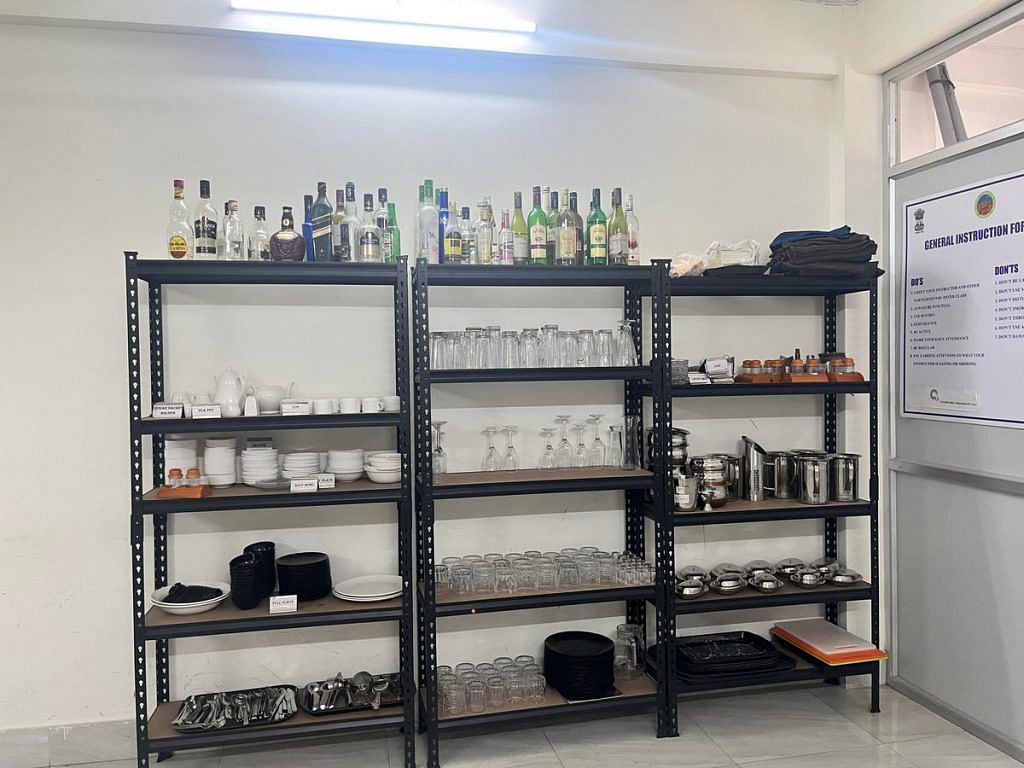
Candidates enrolling for hospitality courses tend to already be fluent in English, underscored Patrick Singson, a skill development manager at YouthNet, a Dimapur-based NGO that focuses on entrepreneurship and skill development. The language is used in every sphere of life in the state, whether in professional settings or social circles, he said.
“In terms of communication, their (Naga people) English is better compared to speakers from the mainland,” said the government official quoted earlier.
The official emphasised another factor that distinguishes Naga youth — their “early grooming” in westernised social niceties through church activities in the predominantly Christian state.
“Their society gives them that smartness,” he said, referring to their social skills and care toward self-presentation.
Walking the streets of Nagaland, many young people can be seen wearing trendy, in-season outfits, not a hair out of place. In an industry where presentation matters, this isn’t lost on employers.
Grooming is a top priority for the sector, noted Phom, surrounded by framed MoUs between her institute and various hotels.
“Naga people are very fashionable. In this industry, it matters how you present yourself in front of the customer or the guest,” she said. “Naturally well-groomed, hardworking people, with good communication skills and hospitable traits are needed. These are the qualities they see in us. So, they prefer people like us.”
Sometimes, the parents are not open-minded about sending their daughters out. They want them to get a certificate but not the exposure
– Tokato Chishi, state head of PLS Auto Shell Institute
The training centres are not high-end and the courses usually span only 2-3 months, but Naga workers seamlessly fit into the industry, navigating chandeliered lobbies and wood-panelled piano bars with the same poise as the patrons they serve.
Moreover, hospitality offers better opportunities for placement that other service sectors like beauty and wellness, healthcare, or more technical occupations like those of an electrician or plumber.
“For other sectors, the placement opportunities are not very good. People don’t ask about the job role; they only ask if there is 100 per cent placement after their course. In most of the hospitality institutes, placement is good,” said Phom.
Her organisation, Emporium, which has its head office in Kolkata and opened the Dimapur branch in 2018, initially offered vocational courses under the Skill Development Ministry’s Pradhan Mantri Kaushal Vikas Yojana (PMKVY) where it saw 80 per cent placement. The pandemic almost forced the institution to shut down, after which it ditched the PMKVY and began offering a paid fast-track course focused on aviation, hospitality, and the cruise line industries. It charges Rs 23,000 for a two-month course. In the last two years, it has enrolled 1,200 students and seen nearly 90 per cent of its candidates placed. Currently, the institute is teaching nearly 200 students in 8 batches.
However, even if Nagaland has all the makings of becoming India’s hospitality powerhouse, the state still simmers with untapped potential.
Skill development is a cornerstone of the state’s strategy to combat its high unemployment rate, particularly among the 15-29 age group, which stands at 18.5 per cent, compared to the national average of 10 per cent
Invisible barriers
Parental anxieties, fears of racial harassment, and a long history of insularity from the “mainland” are putting the brakes on a Naga takeover of the sector in metros and tourist hotspots.
The Nagaland government is extensively implementing central schemes like PMKVY and Deen Dayal Upadhyaya Grameen Kaushalya Yojana (DDU-GKY) to train hospitality workers. They’ve also boosted education infrastructure by opening the State Institute of Hotel Management & Catering Technology in Dimapur (2019) and roping in private players. Despite these efforts, reports of racial abuse faced by Nagas outside the state have left many hesitant to venture beyond its borders.
Compounding this are tales of exploitation of women and negative perceptions about the industry. For instance, in 2020, the state’s media reported of Naga spa workers being involved in a sex work racket in Maharashtra. Earlier this year, a viral video showed a Naga woman, who ran a spa in Ahmedabad, being dragged by the hair and assaulted. Parents also worry about their daughters adopting “bad habits” once they are away from home.
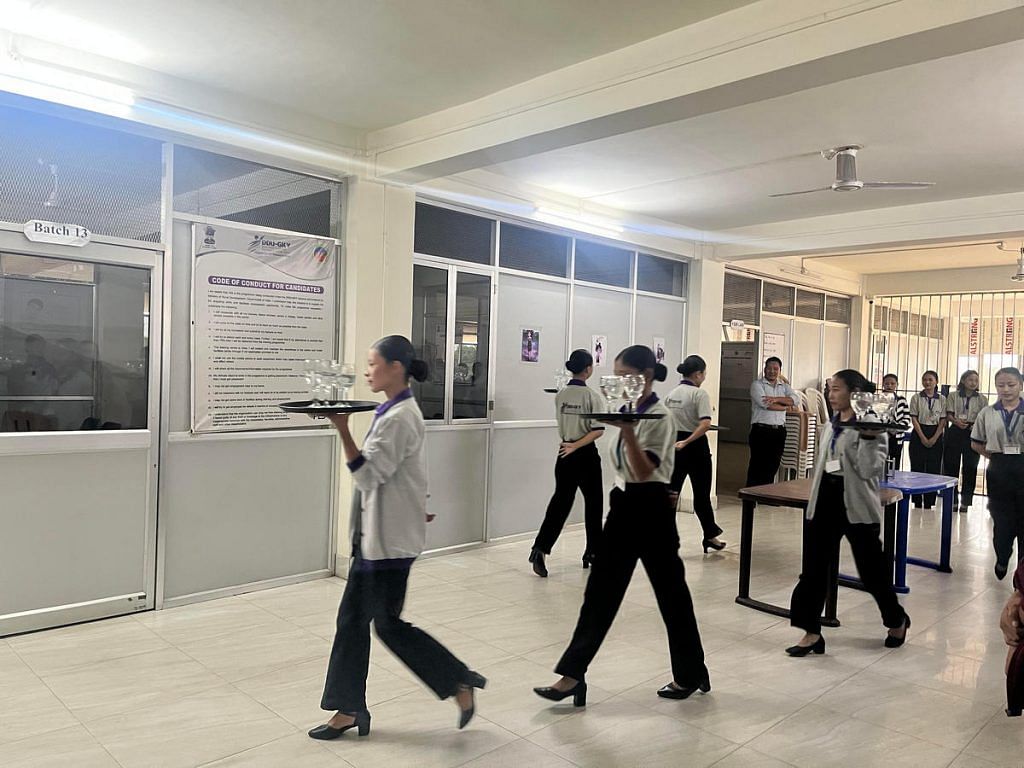
“A lot of Nagas are going outside, but contrarily, a lot are not going as well because there are a lot of safety issues,” said the government official. “Here, the decisions are made by the family and many are not willing to send them outside Nagaland.”
A private centre, PLS Auto Shell Institute, won a government tender to provide free vocational skill training to 400 women candidates within 3 years under the DDU-GKY’s skilling and placement initiative. In two years, 200 women have been placed in properties like Leela Palace Chennai, JW Marriott in Kolkata, and other 5-star hotels across the country and even in Abu Dhabi, Oman, and Bahrain in the Gulf. But the journey has not been without bumps.
“While the selection process is on, we reject candidates who are not ready for placements. But sometimes the parents are not open-minded about sending their daughters out. They want them to get a certificate but not the exposure,” said PLS Auto Shell Institute’s state head Chishi. “One bad incident or story of someone getting into bad habits or a misconstrued story about someone’s experience is enough to make people sceptical of sending their children outside.”
Most outward migration originates from towns like Kohima, Dimapur, and Mokokchung, but the government struggles to enroll beneficiaries from BPL families for its schemes. Away from the urban pockets, an insular Naga community is apprehensive about big cities, changing lifestyles, and their traditional cultures getting diluted.
Even when a big opportunity like working in Japan comes knocking, there are few takers. Japan’s Specified Skilled Worker (SSW) residency programme, launched in 2019, aimed to recruit workers from India and other countries for specific roles. Under the tie-up, 60 workers for nursing care were required from the entire Northeast, with 10 from Nagaland. But the state couldn’t fill up the slots. This year, the programme has broadened its scope to include the hospitality sector, but currently, only two Naga workers are undergoing training for nursing care.
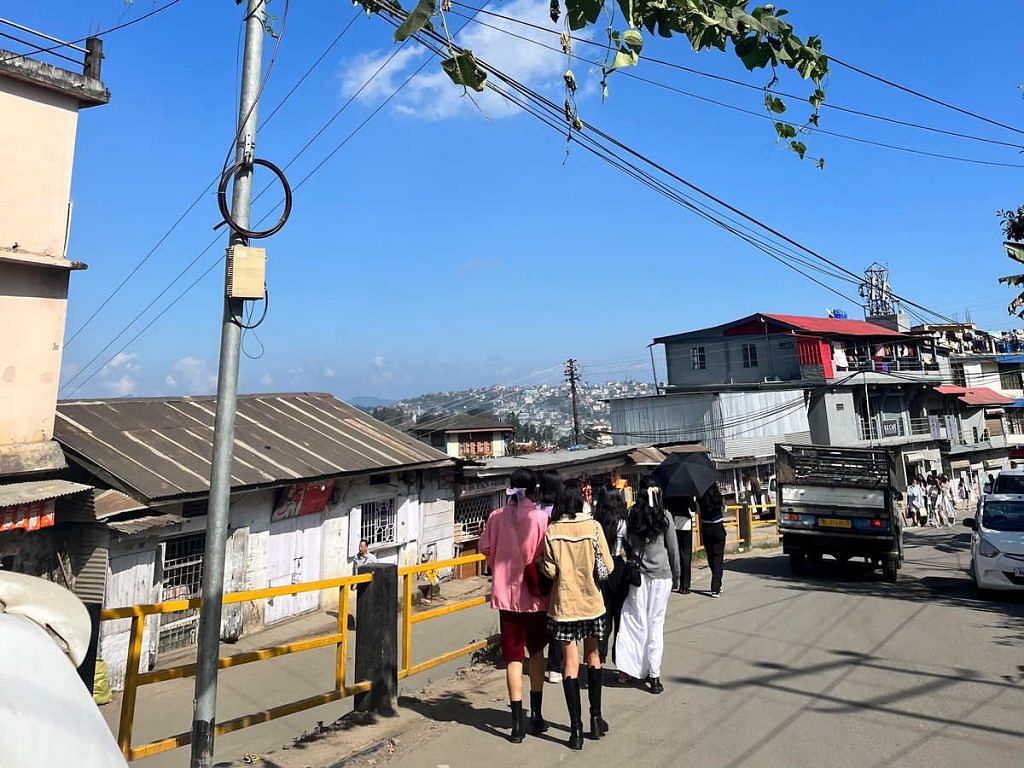
“Japan specifically wants Naga youth due to three factors—the eating habits, physical features, and (the perception that) they can easily adapt to Japanese culture,” the official said.
While it may seem that individuals from Nagaland dominate hospitality jobs, the official noted a growing trend of workers from other northeastern states joining the industry. “It’s mostly Manipuris and Arunachalis taking up those posts,” he said.
Also Read: Nagaland’s no longer the only state without a medical college. Can Kohima be next Vellore?
Testing the boundaries
To counter the challenge of students hesitating to work outside Nagaland, training institutes are exploring placement locations closer or more similar to home in terms of weather and terrain, such as Uttarakhand and even Chandigarh. Climatic conditions, geography, concerns about discrimination, and dietary habits often influence decisions on work destinations for Naga workers, explained the government official.
Officials and other professionals involved with vocational training centres, both private and government-funded, are confident that more youth will embrace the hospitality industry once they get the right training and exposure.
Skill development is a cornerstone of the state’s strategy to combat its high unemployment rate, particularly among the 15-29 age group, which stands at 18.5 per cent, compared to the national average of 10 per cent, according to the sixth annual Periodic Labour Force Survey (PLFS).
Currently, the state boasts over 20 institutes delivering courses under PMKVY (Skill Development Ministry) and DDU-GKY (Rural Development Ministry) programmes, said YouthNet’s Patrick Singson.
For 24-year-old Yenchilo Ngullie from Wokha, one of these courses took her to distant reaches of the country. Having left studies after Class 12, she was sitting idle at home until a friend opened her eyes to the possibilities of the food and beverage sector.
“There are a lot of opportunities working in hotels. You can move to other places, more cities. There are so many hotels in the world,” she said.
After completing a course at PLS Auto Shell, Ngullie and 19 batchmates landed placements at the Westin Hyderabad Mindspace in Telangana. In less than two years, she rose to the position of team leader and is now thriving at a Hyatt property in Goa.
Ngullie, who loves to travel, meet new people, and learn languages, picked up Telugu during her stay in Hyderabad. Now, she wants to learn Konkani but says it’s “quite a difficult language”.
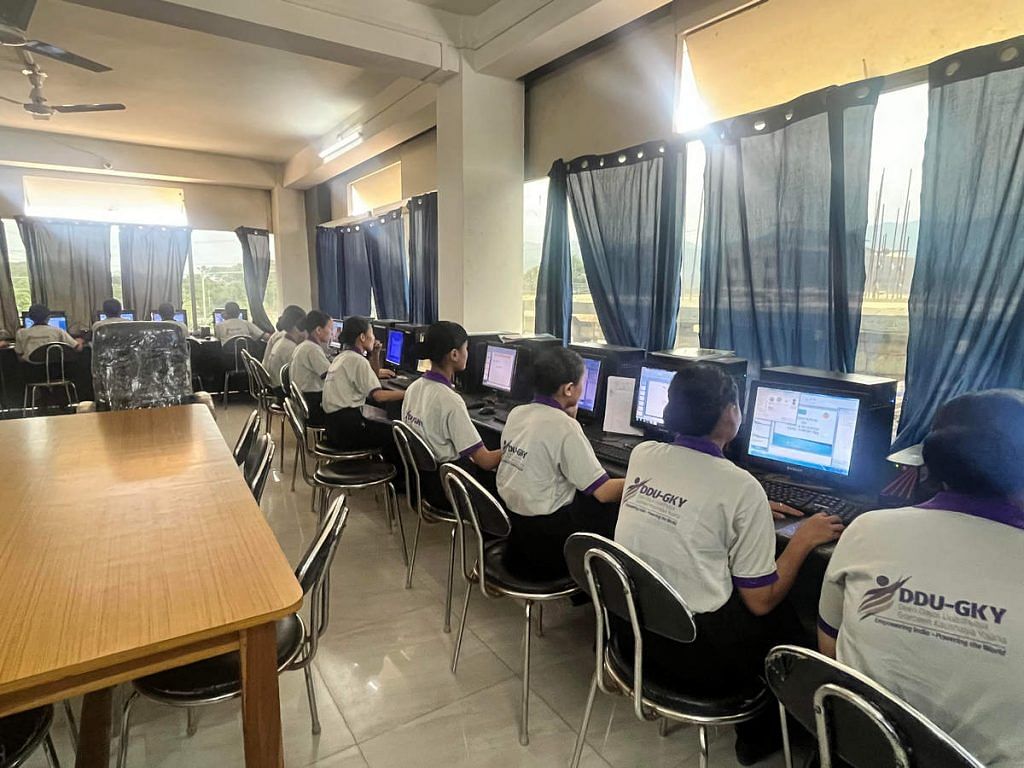
Back in Chümoukedima, at Ngullie’s alma mater, a fresh batch is preparing for a soft skills class.
The focus is on strengthening interpersonal skills and confidence-building through exercises like singing songs, reading newspapers, and telling stories – all aimed at polishing their English for high-end workplaces.
“Not all students come from the same educational background. Some of them are hearing the names of some food items and foreign cuisines for the first time. We train them to get familiar with such nuances,” said Akulia Sumi, a teacher at the institute.
One of the students, 22-year-old Sinken, is going through her notes inside the classroom. “I like doing the practicals. We learn about folding napkins, how to serve beverages and food, and how the two are done in different ways,” she said.
Sinken didn’t always dream of joining the hospitality industry. She initially aspired to pursue postgraduate studies in Political Science. However, as the eldest of nine siblings in a BPL family from Mon district, this wasn’t a practical option.
“I couldn’t take up an MA because we are so many children. When I told my parents about the hospitality course, they agreed since I wanted to work,” she said. Sinken is at peace with her decision. “Hospitality isn’t bad. It has job security,” she said.
(Edited by Asavari Singh)


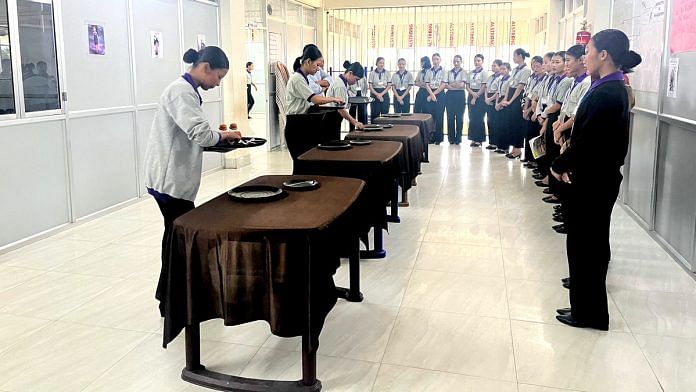

This is a critically important initiative. 67% of the people (as per normal distribution) need skill development, after 14 years of schooling, in crafts and skills that will help them make a pleasant journey of life.